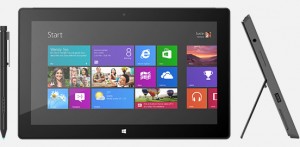 The inescapable question for Microsoft at HIMSS 2013 is this: How does the company maintain relevance in a mobile ecosystem increasingly dominated by Apple iPhones and iPads? With its Surface Pro tablet, Windows 8 operating system, and Office 365 HIPAA-compliant cloud platform, not to mention a bevy of new app partners, Apple's longtime rival is doing its best to step up to the plate. The company recognizes that healthcare is one of the biggest battlefields.
The inescapable question for Microsoft at HIMSS 2013 is this: How does the company maintain relevance in a mobile ecosystem increasingly dominated by Apple iPhones and iPads? With its Surface Pro tablet, Windows 8 operating system, and Office 365 HIPAA-compliant cloud platform, not to mention a bevy of new app partners, Apple's longtime rival is doing its best to step up to the plate. The company recognizes that healthcare is one of the biggest battlefields.
"We focus on tech as an enabler, and how Microsoft plays a role," Michael Robinson, head of health and life sciences for Microsoft in the US, told MobiHealthNews. "It's a multibillion dollar business for us; it's about working with our partners. [Healthcare] is the fastest growing vertical within Microsoft."
Although some CIOs have purchased iPads for clinical use, a lot of iOS devices find their way into hospitals through BYOD channels -- physicians bring in their home devices and hospital IT teams have to find a way to make them work in the hospital workflow. Because Apple builds its devices for consumers, not for enterprise, this can be a vexing situation for CIOs, said Microsoft Worldwide Senior Director of Health Dr. Bill Crounse in an interview last week.
"I think in the next purchasing cycle, what we are going to see is that as the message starts getting out, coming from health IT there's gonna be this dynamic tension," Crounse said. "No physician wants to put their patient at risk by using a device that's putting information at risk. So I think the next time around, when the physician says 'It's time for me to get a new device, what should I be thinking about?' I think IT is going to be pushing them toward this new generation of devices on Windows 8."
The Surface tablet in particular offers some competitive features, including a larger range of ways to input data into the device.
"[Doctors] are really excited about using all the input modalities they want -- touch, pen, keyboard, voice," Microsoft Chief Health Strategist Dennis Schmuland told MobiHealthNews. "So because these devices are integrated with keyboards and microphones and all these inputs, it leads to better productivity." Schmuland said the pop-up keyboard on Apple devices, which can pose a safety risk by blocking important medical information, is a good example of a way that a consumer device isn't perfectly suited to a clinical setting.
Microsoft also pointed out that the Surface tablet can be mounted and attached to a physical keyboard and mouse and become a desktop workstation. Rather than having a tablet for rounds and a desktop in the office, physicians could just use one device that easily converts between those two forms.
Although Microsoft touts its Surface tablet as a reasonably rugged consumer device, the company also recognizes the diversity of needs in the healthcare space. Unlike Apple, whose iOS is tied exclusively to its devices, Microsoft's Windows 8 runs on over 1,500 partner devices. This is important, Microsoft execs say, because there's no "one size fits all" when it comes to clinical workflow.
"There isn't today nor will there ever be, the perfect device for all clinical workflows," said Crounse. "I think most clinicians will find themselves using a range of devices."
In addition to the Windows 8 operating system spanning a range of third party devices, it's also a single OS across Microsoft phones, tablets, and PCs and is backwards compatible, allowing Windows 8 devices to integrate with hospitals' legacy computer systems or to run Windows 7 computer programs.
Showcasing this idea of a Windows 8 ecosystem, Microsoft announced a number of pilots and partnerships at HIMSS.
- In a collaboration with Intel, Microsoft is launching a proof-of-concept pilot with the Cleveland Clinic. According to a press release, the Clinic will be "exploring the capabilities of Windows 8 and new Intel-powered mobile devices that enable clinicians to view a risk-stratified list of patients and call up their latest medical information."
- Another pilot, with Pediatric Associates, will use Greenway's newly announced PRIMEMobile EHR App for Windows 8.
- In addition to Greenway's PRIMEMobile, Microsoft announced new EHR apps for Windows 8 from Pariscribe and MazikCARE. Allscripts and Epic already had offerings on the platform.
- The company highlighted a number of new apps for Windows 8. Clinical reference apps UpToDate and Electronic Preventative Services Selector both launched on the platform, as well as consumer apps from Johnson & Johnson, the CDC, and Mayo Clinic.
Finally, Microsoft is showcasing its Office 365 HIPAA-compliant cloud platform, which might help address some of the problems surrounding secure physician-to-physician communication in a healthcare setting.
"Office 365 was designed and engineered from the beginning to be HIPAA capable," said Schmuland. "We're one of the only cloud providers that has a business associates agreement. It's a standard agreement that scales from large corporations, down to small platforms. We went through several iterations, so that we had a business associates agreement we knew would be broadly accepted."
That HIPAA compliance extends to the Lync application, Windows 8's messaging system, which means the platform is uniquely positioned to offer HIPAA-compliant video conferencing.


















